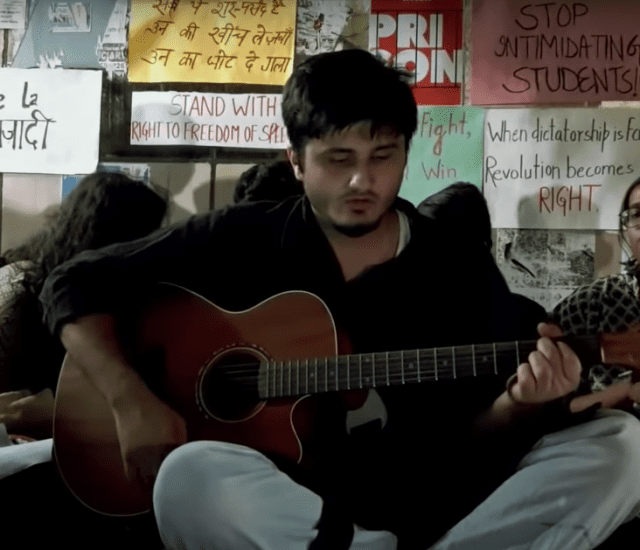photo : Poojan Sahil
In 2019, the song Hum Dekhenge (we shall see) written in 1986 by the Pakistani poet Faiz became the veritable anthem of the protests against the discriminatory citizenship laws in India. This iconic song has a history of rattling the authoritarian regimes in adversarial countries – India and Pakistan.
The poem was written during General Zia-ul-Haq’s oppressive martial law regime. Faiz duped the regime with his use of Islamic imagery to attack the dictatorship. Iqbal Bano, Pakistani singer, wore a saree, banned by Pakistani Government, opened her concerts with Hum Dekhenge. The 50,000-strong crowd joining her in unison made the song a symbol of defying oppressive governments. Faiz might have written the words but it was Iqbal Bano who made them the potent symbol of protest they are to date. The song remains just as effective, evocative and powerful in India today as it did in 1986 Pakistan.
The Citizenship Amendment Act was a move to set religion as a basis of citizenship through immigration in India and was seen to be against the secular and constitutional values of the country. This led to nationwide protests and many students joined the movement. The authoritarian way in which the government tried to repress the agitation and use of brute force on students was countered by the stoic resistance and the courageous defiance in the form of Hum Dekhenge.
Hum Dekhenge : Faiz’s Iconic Song Defines The Anti-CAA Protests
The song predicts the fall of oppressive and regressive forces, the subjugated today shall rule tomorrow :
When the mountains of oppression and cruelty
Will float away like carded wool. We shall see.
Underneath our feet – we the oppressed
The earth will beat like a thumping heart
And the sky over the head of the rulers
Will cackle in a scary thunder
The legacy of the song lives on. It has been invoked again in the current Farmer’s Movement against Farm Bills in India. Even during the ongoing pandemic, as the fight for justice and equality continues in the country, the song is echoed by those demanding the fulfillment of these ideals. Even though the protests have dwindled in scale during the pandemic, online proliferation of the song has continued to grow which seeks to spread the message of justice and solidarity. The song has thus emerged as and continues to be a symbol of protest invoked for the protection of democratic values. The song has garnered an important emblematic role in contemporary Indian society and represents the will and desire for freedom among the people.
Protest Songs in India: Meet Musicians Singing the Songs of Change
This video includes interviews and insights by numerous Indian artists such as Sumit Roy, Poojan Sahil, and Armaan Yadav, who sung Hum Dekhenge and produced other protest songs in 2018 and 2019. It includes snippets of the songs being performed as well as the motivations of artists who produced or sang them.
Poojan Sahil’s version of the song Bella Ciao : the lyrics are adapted to the recent punjab farmers’ struggles and protests
Armaan Yadav’s song Fist Up reniews with underground and politicised hip-hop. The powerfull video clip shows the reality of the recent social movements in India.
« Mainstream hip-hop and news media will have you turn a blind eye to all the injustice in the country. However, underground hip-hop hasn’t forgotten its roots in resistance. This is for every single artist, activist and ordinary citizen that has had to take on extraordinary responsibility due to the negligence and deliberate avoidance of those in power. We have not forgotten. Choose a lane, and get your fist up. In solidarity. » Armaan Yadav
the author :
Kaustubh Misra is currently a first-year undergraduate student at Sciences Po, Paris, Campus de Reims. He is an Indian citizen who is currently living in France and is interested in looking at music and its impact from different perspectives.
photo : Poojan Sahil
This article is a result of a collaborative project between #AuxSons and Alejandro Abbud Torres Torija, lecturer at Sciences Po Paris Campus Reims, and regular contributor to #AuxSons. As part of the class “Sounds of the world : Music as mirror of the intimate and the collective”, international students from Sciences Po Paris Campus Reims prepared articles presenting contemporary music from different parts of the world in connection with recent socio-political events.


